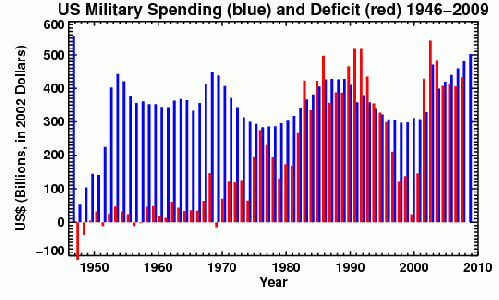The US has been a militarist nation since World War II. When the war ended, the US entered a new conflict, the “Cold War”. The Soviet Union and the “threat of Communism” became sufficient cause to continue military spending and preparedness at unprecedented peacetime levels.
Traditionally soldiers built their own barracks, cooked their own food, washed their clothing, dug their
own latrines and provided the logistics that brought supplies to the front. This has ended. Now contractors do these jobs. At the end of 2006, there were well over 100,000 contractors in Iraq. We tend to think of contractors as being mercenary fighters like those of Blackwater. Certainly some actual fighters are contractors, but most do other things. Contractors drive trucks carrying supplies to the bases, they cook and serve food to troops, wash dishes and laundry and build the bases occupied by US soldiers. These are significant changes.
When US troops provided their own logistics and support, opportunities for for war profits arose largely through the provision of supplies. American business supplied materials such as food, vehicles, weapons, airplanes, trucks, jeeps, tanks, ships and all the sundry items needed to maintain the daily lives of the average soldier. It required many military logistical personnel to support one soldier in combat. None of these soldiers were or are paid very much. The cost of logistics, while significant, was a relative labor cost bargain. In addition, the military made no profit on the work performed by GIs. That is no longer true.
Since 2000, there has been a huge increase in private contracts let by the US government. Spending on private contractors has risen from $174.4 billion to $377.5 billion, an increase of 86%. Over this same period, private contractors' collections for the Department of Defense increased from $133 billion to $279 billion annually, an increase of 102.3%. These expenditures represent a unique new source of revenue and profit for American business, because much of what it being purchased are services which would previously have been done by military personnel. (source http://oversight.house.gov/story.asp?ID=1071) With these tasks shifting to private contractors, workers can be hired in low wage nations such and put to work doing menial labor for the troops. This is not to say these services come cheap. They do not. Contractors such as Kellogg Brown and Root (KBR) charge handsomely for the meals, laundry and logistics provided. They just don't pay the workers who perform these tasks much. The difference, of course, is profit. What was once a relatively minor expense to taxpayers in the form of Army pay for soldiers performing kitchen duties, now becomes a major source of bottom line revenue for private companies who previously got nothing from these services. In addition to new opportunities for profit in a war theater, there are new opportunities for corruption. Third World contract workers have reported their employers withholding their passports, effectively making them indentured servants. KBR and it's subsidiaries have been discovered charging premium prices for meals they never served and with supplying contaminated drinking water to the troops. Government investigators report literally billions of dollars have gone missing with no accounting for who received them or what was done with the money.
The Center for Public Integrity (www.publicintegrity.org/wow/bio.aspx?act=pro&fil=IQ) has a listing of contractors in Iraq and Afghanistan and the value of the contracts they hold. Many of the contracts are awarded without competitive bidding, and billions of dollars have literally “gone missing”. The Chicago Tribune reports ongoing investigations of Kellogg Brown and Root and various of their sub-contractors for gross violations and fraud. www.chicagotribune.com/news/nationworld/chi-kbr-war-profiteers-feb21,1,5231766.story.
All of this is symptomatic of deeper problems. We have privatized war, an in so doing, we have reduced the populace's natural resistance to war and increased its profitability. With contracting, our military can be smaller. This means the conflicts can be more easily handled with a voluntary, professional military. Conscription can more easily be avoided along, as can the political backlash from potential draftees and their relatives. With privatization, a greater portion of military spending flows as profit to American businesses. Spending on contractor services can expand massively within the context of war. Wartime allows emergency measures and expenditures which can proceed without customary bidding or oversight. The result is a river of profit with little economic gain for the nation.
As the US slides into recession, economists wonder why the massive government spending on Afghanistan and Iraq provides so little economic stimulus. World War Two brought an immediate end to the Great Depression, yet a current $600 billion dollar defense budget (not counting the wars in Iraq and Afghanistan) does little to stop the emerging recession. Part of the minimal effect results from the fact that we were already spending well over $300 billion on the military prior to 9/11, whereas the US defense budget was trivial prior to the beginning of World War II. The other reason for the minimal economic stimulus lies in the fact that so much of the expenditure goes to fund wages and corruption in Iraq and Afghanistan, and so much flows as excess profits to American corporations rather than into the pockets of American workers who would have a greater tendency to spend those earnings here. Finally, even the portion of war spending that does flow to American workers has, today, a very high probability of being used to buy imported consumer goods, providing stimulus, ironically, to our friends the Chinese—the very people who fund our wars (but that's another story).





